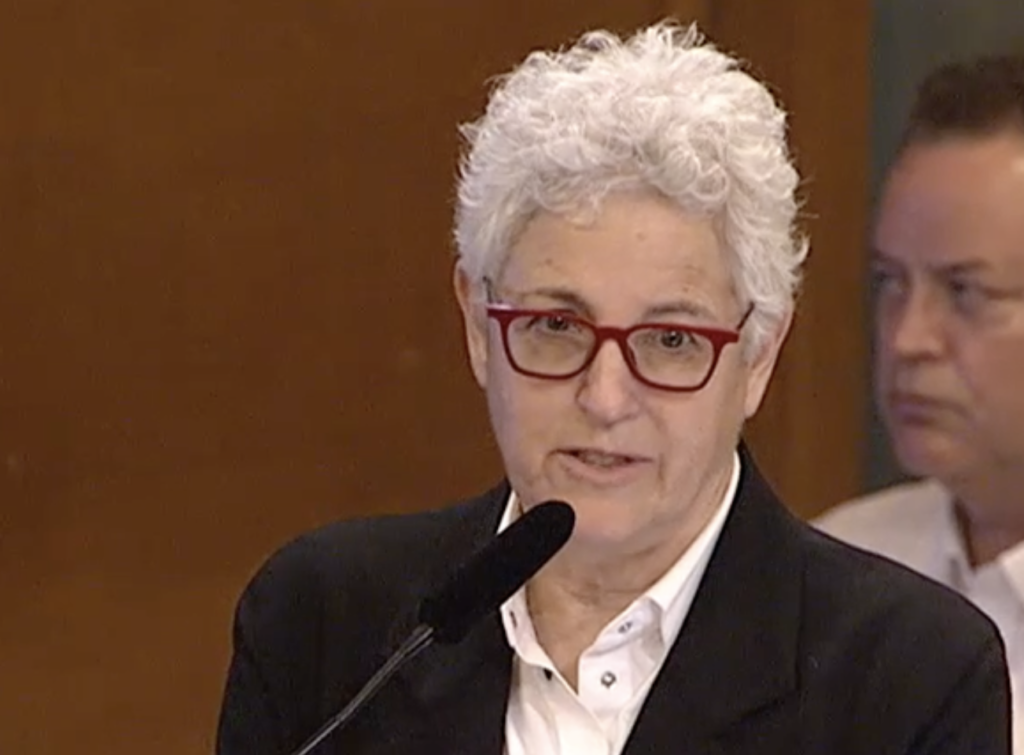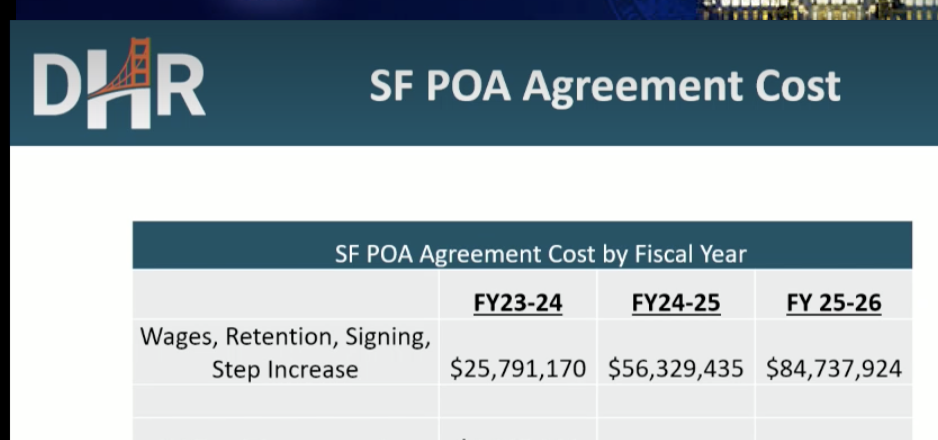Even in San Francisco, where the General Fund is around $6 billion a year, $82 million is a big number.
It’s almost twice the entire budget of the Public Defender’s Office, which is being asked to take a 7.5 percent cut, potentially mean the layoff of 17 trial lawyers. It’s about the same as the full annual budget for the District Attorney’s Office. It’s more than enough to reduce all the cuts at City College.
It’s enough to build supportive housing for at least 130 people who are now homeless.
It’s also the difference between what the Mayor’s Office said a new three-year contract with the Police Officers Association would cost, and what it will actually cost.

The hearing of the Government Audit and Oversight Committee Thursday/6 was pretty astonishing: The director of the Department of Human Resources, Carol Isen, told the committee that the total cost of the new MOU, which includes raises and retention bonuses, was $84 million over three years. That’s what she and the Mayor’s Office also told Sup. Dean Preston, who chairs the committee.
Preston told me he had read the MOU before the hearing, and that wasn’t the number he was seeing; in fact, the deal looked most like $166 million.
Isen told the panel that this was just “a semantic difference,” and that in fact the total cumulative price to the city was $84 million.
“That’s just wrong,” Preston said.
And indeed, when Steve Ponder, the senior numbers person at DHR, took the podium, he explained that his boss was in error: The city would pay out an additional $84.7 million in year three—and $25.7 million in year one, and $56.3 million in year two. Total tab: $166.7 million.

“That’s a big deal,” Preston said.
The supervisor later told me that he was prepared to discuss the original figure that Isen had shared with him, and “I was alarmed to be getting conflicting numbers from DHR. Mayor London Breed and DHR had been using the $84 million figure for months.” Indeed, that’s what the news media have been reporting based on the mayor’s statements.
Yep, people make mistakes, but this is more than semantics.
And other than the Examiner, which reported on the hearing and cited “confusion over costs,” nobody is making much of a fuss about this.
Imagine what would happen if one of the progressives proposed an $84 million plan for housing the homeless, or reparations, or tenant protections—and then suddenly said at a hearing that gee, the real number is $166 million.
The Chron would go nuts. The TV stations would pile on. The mayor would talk about how the progressives lack fiscal responsibility. The whole incident would become the stuff of attack mailers next year.
But when it comes to the cops? Crickets.
Let’s go a step further.
Breed and Isen (and others) have been arguing that that we have to throw a lot more money at the cops to improve retention; too many officers are leaving for other jurisdictions or taking retirement the moment they are eligible.
Fair enough: Giving workers a raise or a bonus is often a good way to keep them from leaving their jobs. And some of the other jurisdictions in the Bay Area pay their cops a bit more than San Francisco does.
But pay might not be the only reasons cops are leaving the San Francisco force or getting out of law-enforcement entirely. And higher wages might not be the only thing that would help with retention.
The problem is, nobody knows for sure: Isen said the city went into negotiations with the POA lacking any data from, say, exit interviews (a standard procedure at many operations) that would indicate what was causing cops to leave and what might keep them here.
“It’s inconceivable to me that we don’t have that data,” Preston said at the hearing.
Never mind: The committee members voted to move the MOU forward anyway, with Preston dissenting. It will now go to the full board, which will almost certainly approve it.
Here’s what’s going on in San Francisco: The mayor has in effect told the cops that they can have anything they want. Between this MOU and the overtime supplemental, that’s almost $200 million—two-thirds of the city’s projected budget deficit for next year (although most of the MOU costs won’t come into play until 2025 and 2026).
It’s a blank check for the Police Department and the POA. And while the tech bros, with the help of the local news media, sensationalize a tragic killing of a rich white guy, and create the perception that we need more cops, right now, at any cost, violent crime is actually down. As Joe Eskenazi notes in Mission Local:
San Francisco’s street situation seems to bewilder many: The city is awash in visible homelessness, drug-use, misery and chaotic behavior. That’s been the case for decades, but the drugs are now more dangerous and those who are suffering are more visible. Property crime rates are high: There is great wealth in this city and great wealth disparities and people steal things. Violent crime, however, is at near-historic lows. Homicides are low as well. …
San Francisco’s crime statistics reveal that it is safer than most other mid-to-large-sized cities, including those cited by the VC class as places to relocate to escape San Francisco’s crime problem. Year-by-year crime statistics also reveal that, however safe San Franciscans may or may not be — they’ve rarely been safer.
Again, never mind the facts. The media-driven politics in San Francisco has created a situation where any reasonable oversight of the Police Department is tossed away.
Suppose the cops wanted $300 million? Or $500 million? Or $1 billion? At what point would city officials say: Enough?
We clearly aren’t there yet.



